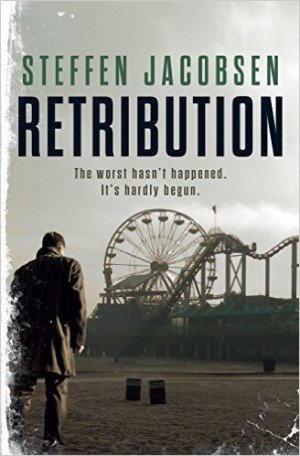
Translated by Charlotte Barslund — Denmark is in a state of shock. A year after Europe’s gravest terrorist atrocity, the security forces, police and intelligence agencies have yet to bring anyone to justice. The young Arab man, who atomised himself and murdered more than 1,000 holidaymakers when he detonated his vest in Copenhagen’s Tivoli Gardens, apparently came from nowhere. The dead are still being mourned.
Senior police officer Lene Jensen also mourns. Her grief is not the result of terrorism, but of personal breakdown and individual tragedy. Her daughter, a troubled soul, committed suicide despite – or possibly because of – psychiatric intervention. Having met a young North African woman who may have been involved in the atrocity, Ain Rasmussen apparently fell in front of a train at the city’s main railway station.
Jensen herself ticks most of the boxes required for fictional police officers. She has a poor relationship with her senior officer, a troubled personal background, but she picks up clues that colleagues miss. Despite a sense of deja vu with the main protagonist, the plot unfolds to reveal that the terrorists are planning an even more spectacular assault on Denmark, and this time their target is an international summit. Jensen’s mildly autistic techno-assistant, Bjarne, thinks he knows how the Tivoli bombers evaded border security, but he cannot get his boss’s attention. We learn that a top security agent, whose own family was wiped out by the Tivoli attack, has successfully planted a double agent close to the beating heart of the terrorist organisation.
The narrative is perfectly paced, and after the early chapters where we discover the motivation and weaknesses of the main players, it becomes a classic ‘will they, wont they?’ thriller, as the various authorities try to piece together the jigsaw of clues and prevent evil from prevailing. Characters in the supporting cast are credible, and convincingly drawn. We have the agent Kim, brutalised by the slaughter of his family; Michael, a Jack Reacher-like private security man, seemingly invincible but flawed; Nazeera the alluring cuckoo in the Al Queda nest. The story’s climax, when the jihadists seem to have lined all their ducks in a row, is breathtaking.
The appetite of English-language readers for Nordic noir shows no sign of abating, but I must own up to the heresy of having been largely unmoved thus far. I was hugely impressed by this book, however. I cared about Lene Jensen and the personal wreckage she towed behind her. I recoiled at the sheer inhumanity of the terrorists, and the incomprehensible grip their faith had on them. I felt chilled to the bone in a literal sense by the bleak and rain-swept Copenhagen streets. I was also chilled, but metaphorically this time, by the helplessness of democracies in the face of the unimaginable hatred and lack of regard for human life carried by the jihadists.
Jacobsen doesn’t preach, but he very cleverly draws out the fact that there are three separate sets of victims amid the carnage. First there are those actually killed, the maimed, and their distraught families. Second, the bombers, who are usually young people seduced into committing such acts by a flawed and perverted sense of injustice. Thirdly – and more subtly – we have the police officers and security forces of the target nations, who have little option but to abandon their own humanity and decency to combat a greater evil. While there is little in this book to bring cheer, light, or comprehension, it is – make no mistake – a blindingly good read.
For more Danish crime fiction, try Jussi Adler-Olsen’s novels, or the novelisation of the TV series The Killing.
Quercus
Print/Kindle/iBook
£4.99
CFL Rating: 5 Stars









